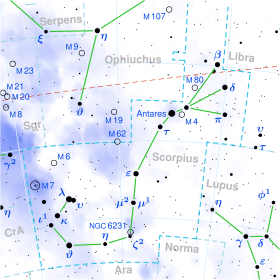V1073 Scorpii is a variable star in the constellation Scorpius. It has a non-Greek Bayer designation of k Scorpii. The star has a blue-white hue and is visible to the naked eye with an apparent visual magnitude that fluctuates around +4.87.[2] Parallax measurements yield a distance estimate of approximately 2,920 ly (896 pc) from the Sun, and it is drifting further away with a radial velocity of +7 km/s.[5] It has an absolute magnitude of −6.8[6]
| Observation data Epoch J2000.0 Equinox J2000.0 | |
|---|---|
| Constellation | Scorpius |
| Right ascension | 17h 04m 49.35254s[1] |
| Declination | −34° 07′ 22.5483″[1] |
| Apparent magnitude (V) | +4.87[2] |
| Characteristics | |
| Spectral type | B0.7 Ia[3] |
| U−B color index | −0.69[2] |
| B−V color index | +0.26[2] |
| Variable type | α Cyg[4] |
| Astrometry | |
| Radial velocity (Rv) | 7.00[5] km/s |
| Proper motion (μ) | RA: +0.600[1] mas/yr Dec.: −2.015[1] mas/yr |
| Parallax (π) | 1.1161 ± 0.2097 mas[1] |
| Distance | approx. 2,900 ly (approx. 900 pc) |
| Absolute magnitude (MV) | −6.8[6] |
| Details | |
| Mass | 28[7] 19.7±1.0[8] 27.11±8.39[9] M☉ |
| Radius | 36.0[6][3] R☉ |
| Luminosity | 302,000[6] L☉ |
| Surface gravity (log g) | 2.70[7] 2.65[3] cgs |
| Temperature | 20,800[9] 22,500[3] K |
| Rotational velocity (v sin i) | 47[7] km/s |
| Age | 4.2±0.3[8] Myr |
| Other designations | |
| Database references | |
| SIMBAD | data |

This object is a massive supergiant star with a stellar classification of B0.7 Ia.[3] It is an α Cygni variable;[12] a supergiant that pulsates erratically on a timescale of days to weeks with an amplitude of less than a tenth of a magnitude. A simplistic fitting of Hipparcos data suggests a periodicity of 1.6 days.[13][11] The star is around 4.2[8] million years old and is a member of the Upper Scorpius subgroup of the Sco OB2 association.[14] V1073 Scorpii is considered a "runaway" star, showing a peculiar velocity of more than 37 km/s relative to its neighbourhood.[8] No bow shock has been detected from its motion through interstellar space.[15]
V1073 Sco has a 14th magnitude visual companion,[16] which is an unrelated background object according to its Gaia Data Release 2 parallax.[17]
References
edit- ^ a b c d e Brown, A. G. A.; et al. (Gaia collaboration) (August 2018). "Gaia Data Release 2: Summary of the contents and survey properties". Astronomy & Astrophysics. 616. A1. arXiv:1804.09365. Bibcode:2018A&A...616A...1G. doi:10.1051/0004-6361/201833051. Gaia DR2 record for this source at VizieR.
- ^ a b c d Ducati, J. R. (2002). "Catalogue of Stellar Photometry in Johnson's 11-color system". CDS/ADC Collection of Electronic Catalogues. 2237. Bibcode:2002yCat.2237....0D.
- ^ a b c d e Kraus, M.; et al. (2009). "Parameters of galactic early B supergiants. The influence of the wind on the interstellar extinction determination". Astronomy and Astrophysics. 499 (1): 291. Bibcode:2009A&A...499..291K. doi:10.1051/0004-6361/200810319.
- ^ Samus, N. N.; Durlevich, O. V.; et al. (2009). "VizieR Online Data Catalog: General Catalogue of Variable Stars (Samus+ 2007-2013)". VizieR On-line Data Catalog: B/GCVS. Originally Published in: 2009yCat....102025S. 1. Bibcode:2009yCat....102025S.
- ^ a b Kharchenko, N. V.; et al. (2007). "Astrophysical supplements to the ASCC-2.5: Ia. Radial velocities of ˜55000 stars and mean radial velocities of 516 Galactic open clusters and associations". Astronomische Nachrichten. 328 (9): 889. arXiv:0705.0878. Bibcode:2007AN....328..889K. doi:10.1002/asna.200710776. S2CID 119323941.
- ^ a b c d Crowther, P. A.; et al. (2006). "Physical parameters and wind properties of galactic early B supergiants". Astronomy and Astrophysics. 446 (1): 279–293. arXiv:astro-ph/0509436. Bibcode:2006A&A...446..279C. doi:10.1051/0004-6361:20053685. S2CID 18815761.
- ^ a b c Fraser, M.; et al. (2010). "Atmospheric parameters and rotational velocities for a sample of Galactic B-type supergiants". Monthly Notices of the Royal Astronomical Society. 404 (3): 1306. arXiv:1001.3337. Bibcode:2010MNRAS.404.1306F. doi:10.1111/j.1365-2966.2010.16392.x. S2CID 118674151.
- ^ a b c d Tetzlaff, N.; et al. (2011). "A catalogue of young runaway Hipparcos stars within 3 kpc from the Sun". Monthly Notices of the Royal Astronomical Society. 410 (1): 190–200. arXiv:1007.4883. Bibcode:2011MNRAS.410..190T. doi:10.1111/j.1365-2966.2010.17434.x. S2CID 118629873.
- ^ a b Hohle, M. M.; et al. (April 2010), "Masses and luminosities of O- and B-type stars and red supergiants", Astronomische Nachrichten, 331 (4): 349, arXiv:1003.2335, Bibcode:2010AN....331..349H, doi:10.1002/asna.200911355, S2CID 111387483
- ^ "9 Cet". SIMBAD. Centre de données astronomiques de Strasbourg. Retrieved 2020-12-02.
- ^ a b Lefèvre, L.; et al. (2009). "A systematic study of variability among OB-stars based on HIPPARCOS photometry" (PDF). Astronomy and Astrophysics. 507 (2): 1141. Bibcode:2009A&A...507.1141L. doi:10.1051/0004-6361/200912304.
- ^ Kazarovets, E. V.; et al. (1999). "The 74th Special Name-list of Variable Stars". Information Bulletin on Variable Stars. 4659: 1. Bibcode:1999IBVS.4659....1K.
- ^ Koen, Chris; Eyer, Laurent (2002). "New periodic variables from the Hipparcos epoch photometry". Monthly Notices of the Royal Astronomical Society. 331 (1): 45–59. arXiv:astro-ph/0112194. Bibcode:2002MNRAS.331...45K. doi:10.1046/j.1365-8711.2002.05150.x. S2CID 10505995.
- ^ Brown, A.G.A.; Verschueren, W. (1997). "High S/N Echelle spectroscopy in young stellar groups. II. Rotational velocities of early-type stars in SCO OB2". Astronomy and Astrophysics. 319: 811. arXiv:astro-ph/9608089. Bibcode:1997A&A...319..811B.
- ^ Peri, C. S.; et al. (2012). "E-BOSS: An Extensive stellar BOw Shock Survey. I. Methods and first catalogue". Astronomy & Astrophysics. 538: A108. arXiv:1109.3689. Bibcode:2012A&A...538A.108P. doi:10.1051/0004-6361/201118116. S2CID 62840857.
- ^ Mason, Brian D.; et al. (2001). "The 2001 US Naval Observatory Double Star CD-ROM. I. The Washington Double Star Catalog". The Astronomical Journal. 122 (6): 3466. Bibcode:2001AJ....122.3466M. doi:10.1086/323920.
- ^ Brown, A. G. A.; et al. (Gaia collaboration) (August 2018). "Gaia Data Release 2: Summary of the contents and survey properties". Astronomy & Astrophysics. 616. A1. arXiv:1804.09365. Bibcode:2018A&A...616A...1G. doi:10.1051/0004-6361/201833051. Gaia DR2 record for this source at VizieR.
